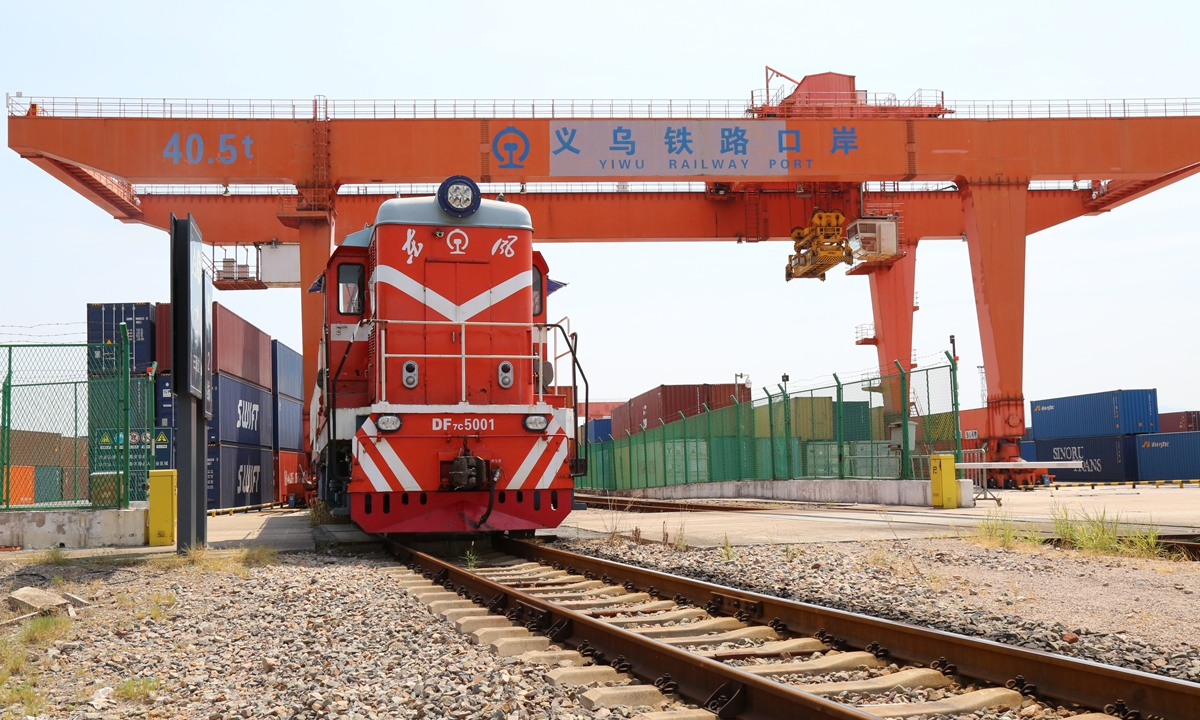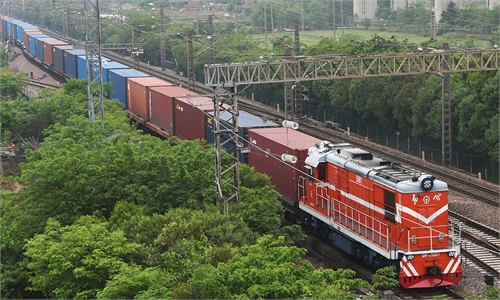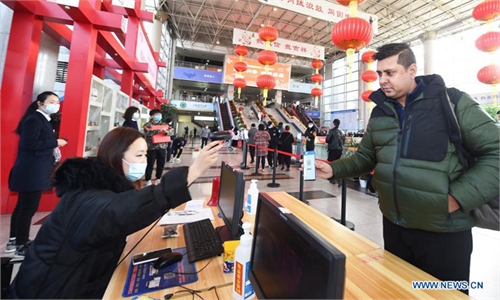Chinese export hub Yiwu lifts static management in trading area, in bid to keep trade flow
Officials, traders ramp up contingency measures to secure shipments

A China-Europe freight train departs from the Yiwu Railway Port and heads to Europe. Photo: Courtesy of Yiwu Customs
Local authorities and traders in Yiwu, a major manufacturing export hub in East China's Zhejiang Province, have adopted various contingency measures to secure shipments and smooth trade, even as the city battles a severe round of COVID-19 outbreak.
While certain impact of the epidemic, which prompted static management, has been felt by firms, overall trade flow has been maintained, industry insiders said on Wednesday.
In the latest effort, Yiwu announced to lift static management in some areas, including the International Trade Market block, from midnight on Thursday.
Yiwu's efforts to secure stable trade offer a window into China's nationwide campaign to stabilize foreign trade, a main economic growth driver, in a bid to keep the world's second-largest economy operating in a reasonable range.
On Wednesday, a meeting on stabilizing foreign trade, which was presided over by Chinese Vice Premier Hu Chunhua, stressed the need to effectively deal with risks, while strengthening the momentum for foreign trade development to stabilize the economy. The meeting called for further efforts to improve customs clearance and services for enterprises.
In Yiwu, even as the city is having a tough battle against the virus, there are reasons for local traders to feel secure, as the government has ramped up efforts to stabilize trade flows, industry insiders said. Such efforts have borne fruit with the historic record of the number of China-Europe freight trains dispatched from Yiwu.
On Tuesday, a train fully loaded with 100 20-foot shipping containers of hardware and daily necessities was dispatched from Yiwu Railway Port to Central Asian countries, breaking the 1,000-train target this year, 45 days earlier than last year, according to a statement Yiwu Customs sent to the Global Times on Wednesday.
Yiwu has implemented temporary "static management" since August 11, but the city still managed to dispatch four to six cross-border cargo trains per day, as local customs has worked to ensure the smooth delivery of goods with contingency measures such as customs clearance reservation service 24 hours a day, seven days a week, according to the customs.
The port customs is also promoting online customer service that allows traders to keep in close contact with customs regarding clearance and other related services without going to the port in person. Such measures help to reduce the risks of infection while boosting service efficiency.
From August 2 to 16, a total of 66 China-Europe freight trains were dispatched from Yiwu, a month-on-month increase of 59.4 percent, including 37 outbound and 29 return trips, Yiwu Customs said.
"The number of transportation routes is increasing, and the volume of shipments is rising. This is my direct impression about the development of the train," said Ye Qiuran, assistant general manager of Yiwu Tianmeng Industrial Investment Co, who is in charge of the railway line operations.
Zhou Peng, a manager with Yiwu Pengyuan International Freight Forwarder, told the Global Times on Wednesday that the epidemic's impact on foreign trade business was foreseeable, and it has already been reflected in the price fall of containers from the region to the US, a sign of weak demand for cargo deliveries.
"The price of a 40-foot container from Yiwu to the US has dropped from $5,700 before the outbreak to around $5,200, a sharp drop that was rarely seen in ordinary days," Zhou said.
The slowed cargo delivery, together with sluggish demand in the global spectrum posed by inflation, has potentially worsened the situation, the insider said.
Despite the difficulties, Zhou has taken an active approach by informing clients about possible delivery delays and changing delivery locations to other cities such as neighboring Ningbo, where the epidemic situation is less severe.
Local officials have adopted a closed-loop management and a white list that enables some major businesses to continue to operate, while implementing epidemic control.
A Yiwu-based trader told the Global Times on Wednesday that trade business is continuing with limited disruption, since the company stocked up adequate goods at Yiwu Railway Port, the hub for China-Europe freight trains, at the earliest opportunity, and these goods can now be directly loaded onto trains under closed-loop management.
While cargo trucks from elsewhere may not enter Yiwu due to epidemic controls, train service remains stable thanks to government support measures, the trader said on condition of anonymity.
"We also have diversified sources of cargo supplies not only in Yiwu, but other cities in the province, to maintain smooth deliveries," the person said.


